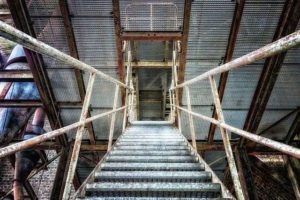A resident of Connecticut recently received a $375,000 settlement after he fell 10 feet when a stairway collapsed. The stairs were located in the apartment complex where the 57-year-old lived and two stairs collapsed because they were severely rusted.
He sustained serious injuries, including a broken kneecap, upper leg and left shoulder. He was standing on the top stairway between the second floor and the third floor when the stairs gave way and he fell. If something like this happens to you, contact our personal injury lawyer.
Notice of the defective condition
The apartment complex is owned by a New York company. It is reported that at least two other people had fallen from rusty stairs in different locations at the same apartment complex before the victim was injured in this case. It is alleged that, in response to those prior injuries, the property owner only made repairs to the stairs involved, not to all of the rusted stairs in the complex.
Nature of damages in this case
According to the victim’s claims, he was starting a new job as an emergency medical technician (EMT) but was unable to work because of the severity of his injuries. He continues to have difficulty walking, lifting with his left arm and reaching overhead. He was also diagnosed with post-traumatic stress disorder (PTSD) following the accident. Ultimately, the victim spent approximately $72,000 in medical expenses.
What is a premises liability claim?
In premises liability case, the success of the claim depends on whether there was a legal duty the property owner had to keep the premises safe, and whether that duty was breached. Not all injuries that occur on someone else’s property result in liability. The exact nature of a property owner’s legal duty depends on many factors. Our personal injury lawyer handles these types of claims.
What duties does a premises owner have?
The duty a property owner owes to someone visiting the property depends on the classification of the visitor. Generally speaking, property owners have a duty to take reasonable care to protect the visitor from known dangerous conditions on the property. If the owner knew of a condition on his property that would pose an unreasonable risk of harm, which his visitors could not reasonably be expected to recognize, the owner must take reasonable care to either eliminate the danger or warn visitors.
Responsibility for injuries on rented property
Landlord-tenant law is usually pretty uniform in that the landlord is responsible for everything outside the apartment unit itself. This would include areas such as entrances, stairways, and hallways. Landlords are also responsible for immovable objects, such as floors, walls, fixtures and any appliances that were already in the apartment. Consequently, the tenant is responsible for his or her own things, which are the movable things inside the apartment.
There may be an exception, however, if the tenant knew about a dangerous condition inside the apartment, relating to something immovable, but says nothing, the tenant may be liable along with the landlord.
Examples of stairway injury claims
Rusted metal stairways are not the only source of dangerous conditions on someone’s premises. Wooden stairs can rot and then give way under the weight of individuals walking on them. Similar to the collapse in this case, that person can suffer serious injuries depending on the distance of the fall. Stairs can also be uneven which can lead to trip-and-fall accidents. Slippery stairs, as a result of rain, snow or ice can result in slip-and-fall accidents, as well. In addition to broken bones, stairway falls often result in head trauma and other types of injuries. Inadequate lighting stairwells can also create a dangerous situation. Pedestrians may not be able to see the defects in a stairwell because of poor lighting. Debris on stairways also poses a danger. If you have questions about an injury you suffered, contact our personal injury lawyer.
Responsibility for injuries on commercial property
Liability for injuries that occur at an office, store or other business will depend, in part, on what the lease or any other business agreement says about liability issues. In many cases, the business will have liability insurance coverage that may apply to your claims. This is why it is important to immediately report any injuries you sustain to the business management, so their insurance carrier can be notified.
Is there a situation where no duty is owed?
There are exceptions. If a dangerous condition is “open and obvious,” meaning it is easy to detect, then visitors are normally expected to protect themselves from the danger. As for trespassers, if the property owner is aware that people are trespassing on the property with regularity, then the owner may be required to take some reasonable action to protect the trespasser as well. For example, if a property owner knows that people in the neighborhood routinely use their property as a shortcut to the park, then a duty may arise to, at least, post a warning.
If you have questions regarding premises liability injuries or any other personal injury matters in Arkansas or Missouri, please contact the Cottrell Law Office for a free consultation. You can contact us either online or by calling us toll-free at (888) 433-4861.



